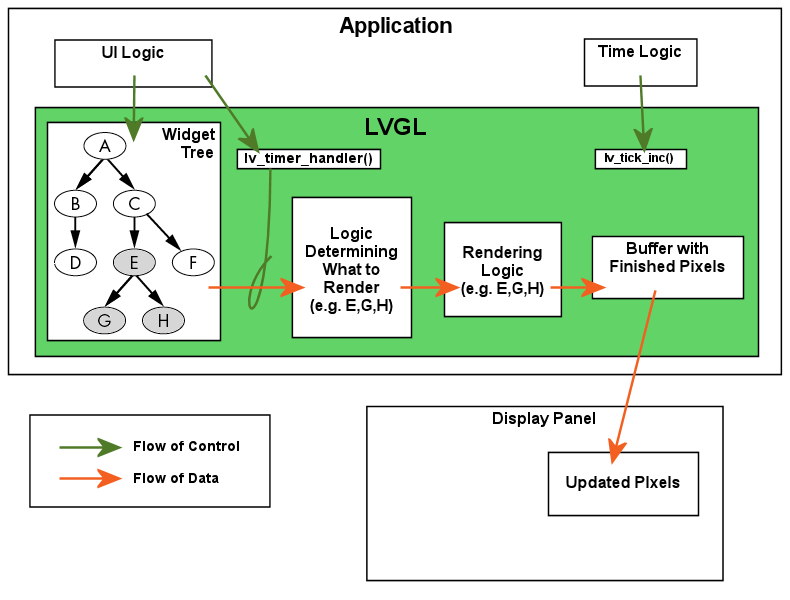Timer Handler¶
To drive the timers of LVGL you need to call lv_timer_handler()
periodically in one of the following:
while(1) of main() function, or
an OS task periodically. (See LVGL and Threads.)

Example:
while(1) {
uint32_t time_till_next = lv_timer_handler();
if(time_till_next == LV_NO_TIMER_READY) time_till_next = LV_DEF_REFR_PERIOD; /*handle LV_NO_TIMER_READY. Another option is to `sleep` for longer*/
my_delay_ms(time_till_next);
}
If you want to use lv_timer_handler() in a super-loop, a helper
function lv_timer_handler_run_in_period() is provided to simplify
supplying LVGL with time awareness:
while(1) {
...
lv_timer_handler_run_in_period(5); /* run lv_timer_handler() every 5ms */
...
}
Or use the sleep time automatically calculated by LVGL:
while(1) {
...
lv_timer_periodic_handler();
...
}
In an OS environment, you can use it together with the delay or sleep provided by OS to release CPU whenever possible:
while (1) {
uint32_t time_till_next = lv_timer_handler();
if(time_till_next == LV_NO_TIMER_READY) time_till_next = LV_DEF_REFR_PERIOD; /*handle LV_NO_TIMER_READY. Another option is to `sleep` for longer*/
os_delay_ms(time_till_next); /* delay to avoid unnecessary polling */
}
See Timer (lv_timer) section to learn more about timers.
When No Timers Are Ready¶
lv_timer_handler() will return LV_NO_TIMER_READY (UINT32_MAX)
if there are no running timers. This can happen if there are no indevs or they are disabled with lv_indev_enable(), running
animations, or running user-created timers. lv_timer_handler() will continue
to return LV_NO_TIMER_READY until there is a running timer. Display
timers will stay paused when there is no reason to refresh.
lv_timer_handler() should be called after something is created, deleted, or
modified so that a refresh will be performed if necessary. In practice this means
waiting without a timeout for some external event. After the
external events are received and handled, lv_timer_handler() should be
called again.
while (1) {
uint32_t time_till_next = lv_timer_handler();
int timeout;
/* Wait forever for events upon LV_NO_TIMER_READY, because there
* is no reason to call lv_timer_handler sooner. */
if(time_till_next == LV_NO_TIMER_READY) timeout = -1; /*infinite timeout*/
/*Otherwise, wait for events at least until the timeout expires.*/
else timeout = time_till_next;
if(poll(..., timeout)) {
/*Handle events before calling `lv_timer_handler` again.*/
}
}
If there is no external event source, you may choose to exit the loop or simply delay for a long time.
If another thread is
calling LVGL functions, you may want to call lv_timer_handler() again
very soon to handle the effects of those other threads.